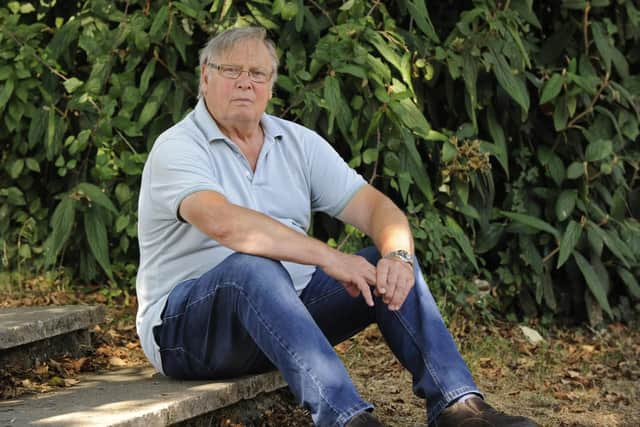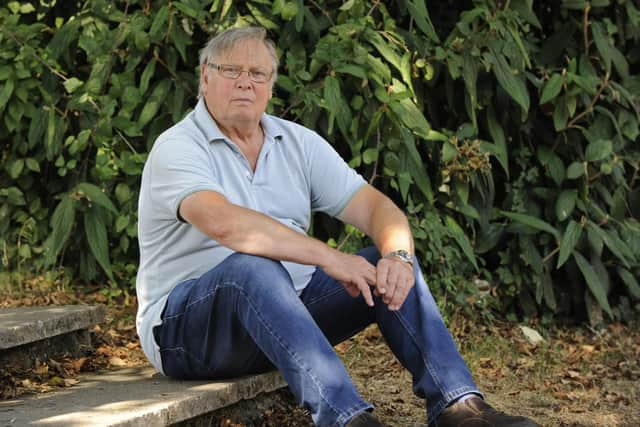'˜Bitcoin con artists scammed me out of £5,000 '“ and my bank did nothing'


Retired former Gosport businessman, Maurice Plummer, claims he was scammed out of £5,000 after being persuaded to trade in the cryptocurrency Bitcoin.
A notorious fake online video featuring the cast of the BBC's Dragon's Den promised him a money back guarantee and sky high returns for investing as little as £250.
Advertisement
Hide AdAdvertisement
Hide Ad'˜I'˜d read some glowing reports about Bitcoin investments, said the 54 year loyal Barclays customer, '˜so I searched online and was contacted by a company called Greenfield Capital in Estonia.


'˜I first suggested investing £500, but was told it wasn't worth the effort. The broker kept on so much that I agreed to increase the investment to £1,000 maximum.
'˜He kept phoning for me to invest more, saying I'd already made £360 but I told them I didn't want to.'
Maurice was due to go on a mini cruise with his partner so for a few days he thought no more about it.
Advertisement
Hide AdAdvertisement
Hide AdBut it was only towards the end of their break that he received an on-board warning call from Barclaycard.
To his horror he learned £5,000 had been drained from his card account by Greenfield Capital, literally while his back was turned.
Unable to reach them by phone the bitter and angry seventy-eight-year-old waited until contact was resumed and demanded the return of his money.
A senior management broker then called and all hell was let loose. He started shouting and abusing him down the line.
Advertisement
Hide AdAdvertisement
Hide AdWhile looking at his computer screen he saw him click on two boxes which immediately made his entire investment disappear into thin air, and promptly rang off.
The following day he received a curt phone call accusing him of mishandling the online account and he could whistle for his money.
When Streetwise got in touch with Barclays a spokesperson said customers were free to use their cards to buy cryptocurrencies. Despite having the resource and access to the Financial Conduct Authority database of dodgy investment firms it was up top them to check the terms of their investment decision before handing over their card details.
The bank denied it had any responsibility for how and where customers chose to invest their funds, despite having a duty of care to protect their money.
Advertisement
Hide AdAdvertisement
Hide AdWhen Streetwise reader Peter Oliver's curiosity prompted him to look for details about online cryptocurrency binary options trading, an advert popped up from unregulated broker KayaFX.
Binary options are a form of high risk fixed odds betting where the price of a commodity or share will rise or fall. Rogue firms promise unprecedented returns.
In what turned out to be almost a carbon copy of Maurice Plummer's experience, Southsea based Peter, 83, says he was immediately sucked into making an investment totalling £10,000 which rapidly increased to £14,000.
'˜It was seemingly attractive at first,' Peter explained, '˜because the balance was actually increasing, but the website online automatic trading system was actually a fake.
Advertisement
Hide AdAdvertisement
Hide Ad'˜The broker tried to pressure me into going for longer trading contracts, but when I declined the account went dormant for a month while I was away on holiday and nothing happened.
'˜When I said I'd like to withdraw my money the investments disappeared. I was told I was involved in long term contracts which prevented me from withdrawing the funds without suffering long-term losses but these never appeared on my screen.'
Peter added: '˜Clearly the screen appearance is a front to deceive clients and persuade them to invest further. When the client declines they're told a different story. They trade down the account even after one request to withdraw the balance.'
A Streetwise investigation into KayaFX trading methods uncovered hundreds of complaints where investor's money mysteriously whittled away to nothing the moment they indicated they wanted to stop trading and withdraw their money.
Advertisement
Hide AdAdvertisement
Hide AdWe put the former retired IBM employee's account of how he was convincingly scammed to his bank NatWest.
As he hadn't received any warning from them KayaFX were an unregulated Estonian based brokerage we were concerned their approach to potential fraudulent investment activity was somewhat laid back.
NatWest told us as soon as Peter told them about the fraud they responded promptly and tried to recover any remaining funds for him but were unsuccessful.
A Â Spokesperson said:Â 'We sympathise with Mr Oliver, who has been the victim of a complex scam and we appreciate that this has been a very distressing experience for him.
Advertisement
Hide AdAdvertisement
Hide Ad'˜We take our responsibility to prevent fraud and scams very seriously and we would remind customers to remain vigilant against any type of scam.
'˜Customers should seek reputable independent or legal advice before committing to an investment, and check the FCA register to ensure that a firm is authorised to give financial advice.'
Streetwise remains concerned that inexperienced investors like Maurice and Peter remain exposed to known investment fraudsters. The banking sector is insufficiently pro-active in protecting their customers from the increase in investment fraud.
The government is set to impose a hotel style star rating on banks in an effort to shame those that take a lax approach to fraud.
The radical proposals would tell customers where their money is likely to be safest, and help them make informed choices about where to bank.
Â
Â
Â
Â